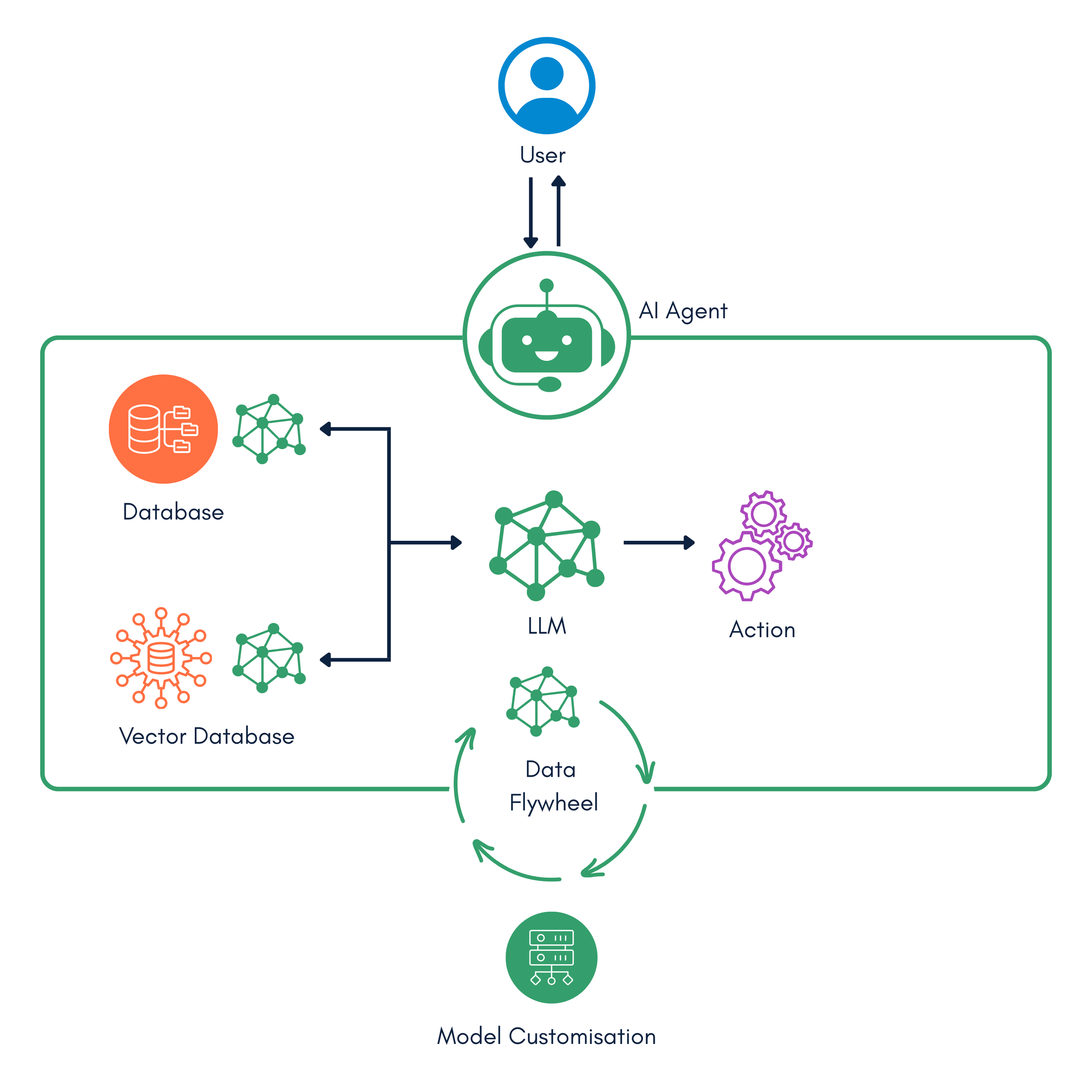Agentic AI and the Future of Business: Embracing the Potential
A New Chapter in AI Evolution
We have all seen the rise of machine learning and the explosion of generative AI, which expanded AI’s role from a productivity tool to a catalyst for innovation. As GenAI becomes more embedded, a new frontier is emerging: Agentic AI.
What Is Agentic AI?
Agentic AI marks a shift from reactive to proactive intelligence. Unlike GenAI, which generates content in response to a user prompt, Agentic AI agents can operate independently - making decisions, adapting to new information, and learning from their environment.
What sets these agents apart is their ability to access live data, interpret context and take action without constant human input. This is powered by a feedback loop known as the data flywheel, which continuously learns from each interaction to improve performance and personalise responses over time.
Imagine an AI that doesn’t just respond; it thinks, plans and evolves.
Agentic AI vs. Traditional Automation
To understand Agentic AI’s potential, it helps to compare it with existing automation tools such as Robotic Process Automation (RPA).
RPA excels at repetitive, rule-based tasks, which can flag exceptions and pull humans into the loop when needed. It has become a powerful enabler of operational efficiency.
Agentic AI builds on this foundation by moving beyond pre-defined scripts. They don’t just execute a process; they understand the context of that process and make intelligent adjustments – they troubleshoot, re-plan and adapt their next action all in real time. They’re not just doing the work; they’re thinking through it. This makes it ideal for complex workflows where human oversight is vital, but constant manual intervention shouldn’t be.
Redefining Business Software
In a recent discussion, Microsoft CEO Satya Nadella predicted that traditional business software will “collapse” in the face of AI’s evolution [1]. His point was not about software disappearing, but about how intelligence will shift. Rather than users working inside separate CRM, ERP or HR platforms, an AI tier will increasingly sit above them, connecting data, executing actions and reasoning across systems on our behalf.
Agentic AI agents do not just automate, they collaborate. One request can trigger a cascade of intelligent actions, tailored to the user’s needs and spanning multiple systems. Imagine a client delivery update that needs to ripple through several systems. An agent detects a supplier delay in the ERP, automatically adjusts delivery timelines in the project-management platform, notifies affected teams in collaboration tools, and updates customer communications through CRM. If the supplier catches up early, the agent revises the plan again, no one has to chase status updates or manually coordinate changes.
The future is not about using software. It is about working alongside it.
Real-World Momentum
The shift is already underway. This year, the IT service management software giant ServiceNow acquired Moveworks, a leader in Agentic AI. Moveworks uses advanced natural-language understanding to interpret employee questions and automate helpdesk requests and issues, without users having to raise tickets or navigate multiple systems [2].
The acquisition addresses some of ServiceNow’s known challenges around self-service by improving their conversational interfaces and enterprise search capabilities, while bridging multiple backend systems under a consistent AI tier. Many existing Moveworks deployments already use ServiceNow as a “system of action,” which gives a head start on integration.
Analysts suggest that once fully integrated the acquisition will help customers reduce service-desk workloads, speed up request resolution and deliver a smoother employee experience across IT and operations.
As ServiceNow’s Chief Product Officer and COO, Amit Zavery emphasised, this approach will “forever change how we work.” [2]
Beyond Efficiency: Building Trust, Happiness and Readiness
Agentic AI is not just about efficiency, it is about experience. By handling routine queries and repetitive tasks, AI agents can free employees to focus on more meaningful work, improving both productivity and satisfaction. For customers, faster responses and proactive service can translate into stronger relationships and brand trust.
But success for most organisations depends less on building new tools and more on leveraging technology vendors’ platforms effectively. Companies need to define clear guardrails; when should agents act autonomously, when should they seek human input, and how should decisions be audited? Effectively engaging employees is equally important. These are strategic not technical choices, which are key to delivering value.
Thoughtful implementation, rather than rapid experimentation, will distinguish the organisations that truly benefit from those that simply deploy another wave of automation.
Final Thoughts
Agentic AI represents a new stage in how businesses and technology work together. But success will not come from chasing every new tool, it will come from understanding how these systems fit your people, your data, and your strategy.
At Deecon, we help organisations make sense of emerging technologies, developing data-driven strategies and planning for adoption in ways that are human-centred, ethical and practical. It is not always about replacing tools, but about making the most of what you already have, identifying where new tools add value, and ensuring those choices are reviewed holistically across the stack.
Our focus is on helping clients make informed, confident decisions today, that prepare them for the intelligent systems of tomorrow.
If you’d like to explore what Agentic AI could mean for your organisation, we’d be delighted to share our insights.
Words by Grace Gleadell
Edited by Shona Claremont



